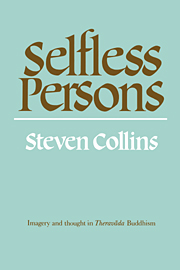Book contents
- Frontmatter
- Contents
- Dedication
- Preface
- Introduction
- Part I The cultural and social setting of Buddhist thought
- Part II The doctrine of not-self
- Part III Personality and rebirth
- Part IV Continuity
- 7 Conditioning and consciousness
- 8 Momentariness and the bhavanga-mind
- Conclusion
- Notes
- Bibliography
- Glossary and index of Pali and Sanskrit terms
- General index
7 - Conditioning and consciousness
Published online by Cambridge University Press: 18 December 2009
- Frontmatter
- Contents
- Dedication
- Preface
- Introduction
- Part I The cultural and social setting of Buddhist thought
- Part II The doctrine of not-self
- Part III Personality and rebirth
- Part IV Continuity
- 7 Conditioning and consciousness
- 8 Momentariness and the bhavanga-mind
- Conclusion
- Notes
- Bibliography
- Glossary and index of Pali and Sanskrit terms
- General index
Summary
It is around the verb samskr – the activity which shapes, arranges together, consolidates, and brings to completion – that the reflections of the Buddha are concentrated, as were concentrated those of the Brāhmanas before him, for it is in it that one finds the key to these two systems which posit a certain kind of action as the source of reality.
Lilian Silburn (1955) P. 200Man, to be sure, merits and earns much in his dwelling. For he cultivates the growing things of the earth and takes care of his increase.
Martin Heidegger (1971) p. 217Chapters 5 and 6 have dealt with ‘conventional’ matters of personality and rebirth, and with the form of self-perception and the attitude to action in Buddhism, which result from this Weltanschauung. In this chapter, and the next, I will turn to the Theravāda's ‘ultimate’ account of continuity (in any form, whether within one life or across ‘lifetimes’ in rebirth). My discussion of this account will have two main levels. On one hand, I will simply present the facts of Theravāda's thought on the matter, and show the ways in which it has manipulated the lists of impersonal element-categories in which alone ultimate doctrine consists, in order to provide an answer to the problem. On the other hand, along with this presentation of Theravāda thinking, I shall be concerned to relate it to its cultural and social context; that is, to its Brahmanical cultural heritage and to its continuing place in the peasant society of South Asia.
- Type
- Chapter
- Information
- Selfless PersonsImagery and Thought in Theravada Buddhism, pp. 199 - 224Publisher: Cambridge University PressPrint publication year: 1982



